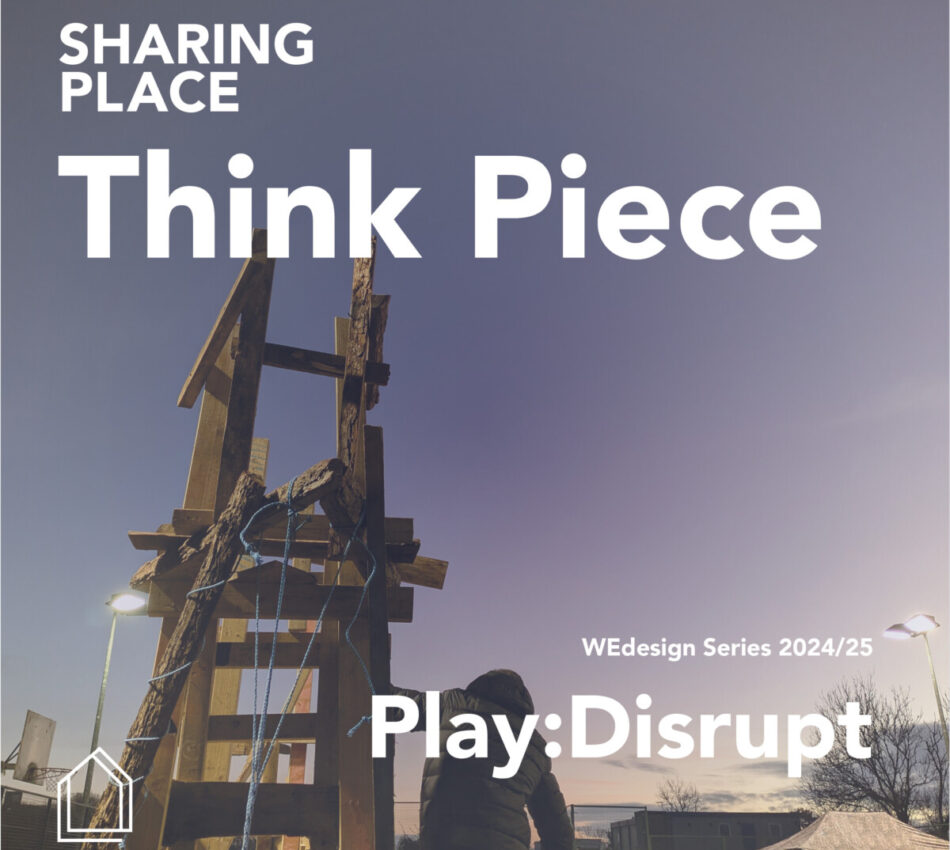Written by:
Sharing Place: Think Pieces invite external contributors to explore the theme of sharing place from diverse perspectives, and offering a broad range of reflections, ideas and provocations.
In this edition, Malcolm Hamilton and Amy Rose from Play:Disrupt talk about the power of play and imagination in shaping spaces with children and young people – and what we can all learn from it.
We are Play:Disrupt, an engagement studio with play and arts-based methods at the heart of our practice. We aim to embed sharing at the earliest stages of planning; as early as the first dreaming. Many of our projects centre on children’s voice. We are currently working in Anglesey, Wales, to ensure that children and young people’s needs are understood and considered, in good time to influence the process and design of place strategies and play provision. Here, we offer a glimpse into our approach.
Think about when you are playing- I mean really playing, whether that’s five- a-side, a jigsaw, slot machines, getting your dog to do a trick, or dancing. When you are really playing, you are really engaged. When children are really playing they are super engaged. In creating, or preferably co-creating, a child centred space, you are tasked with creating a place that supports children to really play. To get lost in their imaginations and energy. In doing that, they build social skills, connect with nature, learn about risks, develop motor skills, stay healthy and bring a place to life.
Children will find ways to play anywhere, but in creating or upgrading a space that is designed to support play, allowing for imagination is key. And if you’re engaging children, or anyone for that matter, in that process- well, we have found that play is a hell of a helpful way to do that.
Adults can get very worried about children bringing in ideas that are beyond the scope or practicalities of the project. Won’t it cause problems if you can’t deliver what they want? It’s true that working with children and young people can be unruly, but their responses are evidence of a creative process at its best. Don’t worry that you can’t deliver everything they ask for, or about disappointing them. They get it. Children really can understand if you are up-front about the limitations of the project— that it may not be possible to deliver everything.
Here’s the deal: you are asking them to share their superpowers of imagination and dreaming. Your job is to stay curious and facilitate an open, creative process that yields meaningful participation that has genuine impact on the outcomes.

So, a double decker swimming pool?… ‘That’s a brilliant idea! I really wish we could have that too….. I wonder…what kind of feelings would that give you? What would that allow you to do?…Are there other ways to have those feelings? What is it about a swimming pool that you enjoy?”

They may say, or draw, or play-act, cooling off in the heat, or splashing. You are collaborating, so explore the idea together. There are a range of water elements that may be achievable. A pond, a rain garden, rill, stream, spray feature or a muddy puddle area might just meet the need and be within budget.
In recent engagements on Anglesey, one child said “I want to be spun really fast, so fast that I actually feel sick!” With reference to the play types outlined by Play Wales, this desire could describe any combination of deep play, risky play, mastery play, or rough and tumble, all essential to children’s development. Perhaps they were seeking to know the edges of their own capacity– to understand what the boundary was between feeling sick and actually being sick? Handy knowledge for anyone, no? And, in this particular town, there was no play apparatus that could support that. So we thought together about all the sorts of ways we might achieve that feeling; rolling down a hill, flying on a zip-line, going on a really high swing, or spinning on a roundabout.

Talking to teenagers about where they hang out, they often talk about abandoned buildings, messy, risky, unsafe. What can we listen to and learn about that? “I can mess about there…there are no rules” In approaching spaces that may look scruffy and ripe for redevelop and ‘improving’, that adults may do well to consider that, as is, these places support teenagers to explore how to organise themselves and their world outside of adult rules- skills that essential to gaining independence and forming identity.

We invite you to let go of images of obedient, smiling children and tidy spaces, with primary colours and oversized building blocks. Children can be messy and noisy, teenagers can be irreverent, create litter, noise and angst. A genuinely shared process of co-creation will be uncomfortable at times; sharing means making space not only for being, but for becoming. And, for us, that process involves curiosity, vulnerability and risk.
All images courtesy of Play:Disrupt.
About the Authors


Malcolm Hamilton and Amy Rose of Play:Disrupt
Play:Disrupt is a Bristol based creative engagement studio working in health, built environment and with Universities. We support a take-part society, seeking out barriers to engagement and inventing playful ways to overcome them. We invite people to play with different perspectives and make complicated issues easy to understand. Active engagement empowers participants, encourages collaboration, and allows more voices to share the stage.
About the WEdesign 2024/25 Series: Sharing Place

WEdesign is The Glass-House’s annual series of free interactive public events, held online and in-person in cities across the UK, where we explore collaborative design in placemaking through discussion, debate and playful co-design activities.
Sharing Place brings people together to propose more equitable ways of sharing our places and spaces, as well as creating places to share experiences, skills and other things we value, through thoughtful placemaking.
WEdesign is The Glass-House’s annual series of free interactive public events, held online and in-person in cities across the UK, where we explore collaborative design in placemaking through discussion, debate and playful co-design activities.
Our online events create provocative spaces for conversation and are open to participants across the UK and further afield. Our Think Pieces bring together a series of blogs from a range of voices to explore the WEdesign series theme.
WEdesign in-person events are safe spaces for diverse audiences to come together to explore challenging issues and to work collaboratively to generate ideas and solutions, co-designing propositions for changes to culture, policy and practice through hands-on making activities, discussion and debate. These events are co-facilitated by students from our WEdesign Student Programme, in collaboration with our partner universities in cities across the UK.
WEdesign is supported by the Ove Arup Foundation.
Find out more and book a place at one of our WEdesign Sharing Place events here.
Visit our WEdesign page to find out more about the WEdesign Programme and how we work with partner universities, students and external contributors here.


